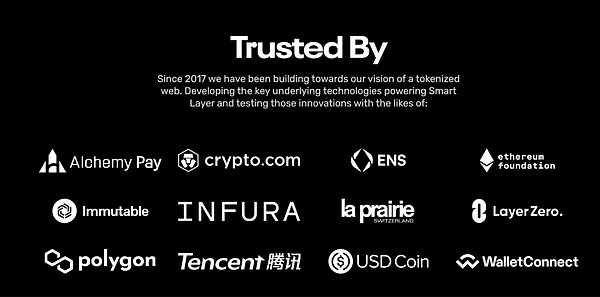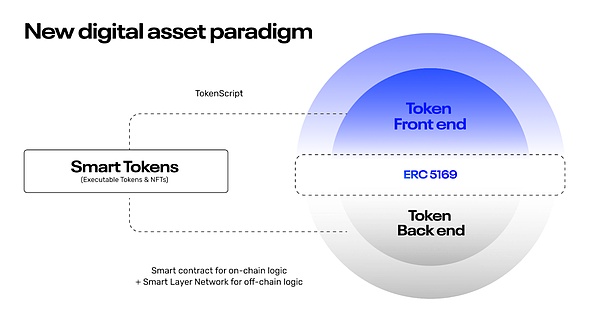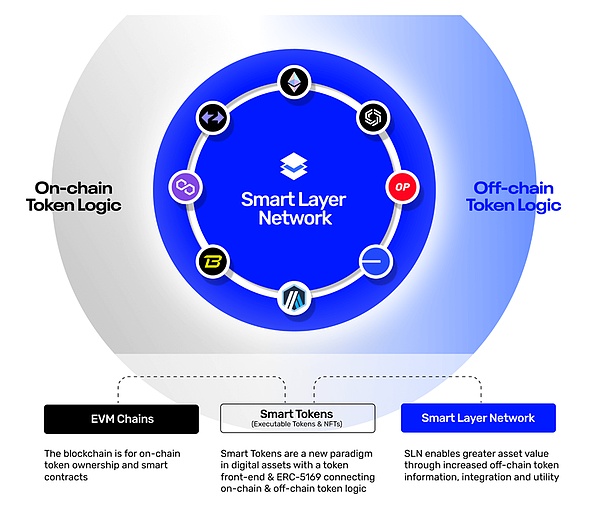For a long time, public chains and Web3 have had an unclear relationship. The user groups of the two are highly overlapping, but the business logic of most projects is done separately. , in the end it is nothing more than relying on the project’s token to connect the public chain and Web3.
It is easy to read literally. Web3 is an upgraded version of Web2. It is regarded as the next stage of the Internet and aims to create a decentralized network. An environment where users control their own data, identities and transactions rather than relying on centralized entities or platforms. Public chain technology is one of the key infrastructures for realizing the Web3 vision.
To achieve a decentralized, secure and user-led Web3 Internet, the technology used can support these characteristics. The public chain provides a secure, transparent, and non-tamperable data recording method, making it possible to conduct value exchange, contract execution, and data storage without a central authority. Therefore, the public chain is a key technology on the road to realizing the vision of Web3.
However, due to the performance and functional limitations of today's public chain technology, many Web3 projects have to compromise and use part of the centralization in practical applications. technology.
For example, a project may choose to use a centralized server to handle some computationally intensive tasks or store large amounts of data, and only handle the core value transfer function through the public chain. . While this compromise improves efficiency and functionality to a certain extent, it also weakens the degree of decentralization.
To truly realize the Web3 vision, we must continue to innovate on the basis of public chain technology.
Smart Layer is an innovative infrastructure that can solve the above problems. As a middleware for removing public chains and Web3 applications, it inherits the advantages of public chains. Security, and the ability to execute complex Web3 business logic, can be described as a brand new concept.
Smart Layer Introduction
< p style="text-align: left;">Smart Token Labs, formerly known as TokenScript, is an open source middleware for programmable smart tokens and Web3 applications that can smoothly connect existing Web2 businesses to Web3.
Smart Layer is an ecosystem that provides a programmable service network for public chains. It opens the era of smart token execution and enables integration with various systems and Complex interactions of tokens become possible.
For token issuers, this platform not only allows them to create and manage programmable smart tokens, but also provides a A middleware solution that greatly simplifies the complex task of integrating web services and token functions. Smart Layer is exactly the missing layer needed to unlock mainstream tokenization use cases.
Smart Token Labs has a very solid background and a relatively long development cycle. In July 2021, the team started from Mark Cuban, Crypto.com, Framework Ventures and Mechanism Capital, etc. It raised $6 million in initial funding from investors.
In September 2022, the investment was led by Liang Xinjun, a well-known investor in the Chinese-speaking circle, and investors such as HashGlobal, Bodl and Fenbushi Capital participated. It received an additional $6 million in financing at a valuation price that was 4 times higher. It shows the support and confidence of professional investors in the track.
At the beginning of this year, Smart Layer issued an article reviewing its development process, stating that Smart Layer has completed the EVM public chain to provide support and can manage commands that are not stored on the chain. Card logic.
In addition, the project also launched the eye-catching Smart Cat xNFT game, which attracted the interest of a large number of players. At the same time, the team also proposed the ERC-5169 standard, which adds a new dimension to the interoperability and functionality of tokens.
At the same time, Smart Layer successfully launched the Loyalty+ plan through close cooperation with InsomniaLabs, which aims to strengthen the relationship between brands and users through public chain technology. loyalty ties. The project already has more than 50 partners, including polygon, Layerzero, Alchemy and other institutions, proving its broad application potential in the industry.

On the operational side, Smart Layer partnered with world top 10 cricket superstar Glenn Maxwell to launch a global fan engagement program using Smart Layer's proof-based, executable NFTs.
As middleware, Smart Layer is of great significance. It not only simplifies the complexity of the transition from traditional Web2 business to Web3 from a service perspective, but also provides development teams with a set of flexible tools that make it easier for them to develop and deploy decentralized applications.
At the same time, through Smart Layer, it also realizes technology that effectively bridges the gap between the public chain and Web3, bringing more security and transparency to users. And a user experience that is not restricted by centralization. Solve the limitations existing in the existing public chain technology environment and ensure that broader application possibilities are opened.
The most important thing is that Smart Layer announced that it will launch an airdrop plan this year (2024)! According to existing information, its SLN token will serve as a service point incentive for the Smart Layer network to ensure the decentralization and smooth operation of the entire network.
Technical details
From a macro perspective, Smart Layer's technology as a whole consists of three parts, the public chain, the anchoring node (Anchoring Node) and the service node (Service Node). From the perspective of what users can perceive, the innovative technology structure of the above three layers of Smart Layer can be divided into two major blocks:
Smart token ERC-5169: An innovative token standard issued on the EVM public chain, which can bring interactivity to tokens while inheriting the functions of traditional tokens.
Smart Layer Network: A network layer that enables tokens to interact. It is a decentralized network foundation that is different from public chains. facility.
Smart Token
Smart Token Labs proposed the Ethereum standard ERC-5169 in May 2022, aiming to enhance the functionality and interoperability of tokens by introducing the scriptURI() function.
This proposal allows tokens to be associated with executable scripts, so that tokens not only carry value, but can also execute complex logic and interact with various systems. From an industry development perspective, ERC-5169 is a key innovation in realizing the Web3 vision, which enables tokens to become intelligent tools that connect users, data and services.
Currently, ERC-5169 has attracted widespread attention from the community and has received a certain degree of recognition. By allowing tokens to be directly associated with external scripts, it opens up a new dimension of token usage and functional gameplay. It is believed that ERC-5169 will one day be included in the official standards of the Ethereum community.

From a technical implementation perspective, the core of the ERC-5169 standard is the introduction of the scriptURI() function. Through this function, the token contract can point to an externally stored script address. This script can contain any form of logic, from simple information display to complex application logic.
This means that developers can add additional functions to the token, such as automated transactions, conditional execution, data retrieval, etc., greatly expanding the utility of the token. Application scenarios and potential.
Developers use the scriptURI() function to specify the location of the external script associated with the token. This location is usually a URL pointing to the location stored in the distribution. Script files on a file system (such as IPFS) or other reliable storage service.

ERC-5169 can not only create feature-rich smart tokens, but also promote the innovation of decentralized applications (DApps) and Web3 services, providing users with a richer, more flexible and secure digital asset experience.
Smart Layer Network
In addition to the new token standard, the core technology of Smart Layer is to provide a decentralized service layer network, allowing EVM-based tokens to implement more complex functions and services.
Smart Layer network uses the architecture of anchoring nodes (Anchoring Nodes) and service nodes (Service Nodes) to maintain the stability and security of the network, and at the same time through distribution Distributed Hash Table (DHT) technology ensures effective distribution and access of information in the network.

Anchor node: Responsible for monitoring and maintaining the overall health of the network, assigning tasks to service nodes, monitoring the execution of service level agreements (SLA), and Manage the recording and submission of token operations.
Service node: performs specific service tasks, such as data storage, content distribution, etc., based on the efficiency and quality of its execution, through Certain incentives are rewarded.
Smart Layer network is different from traditional public chains. Traditional public chains rely on consensus mechanisms, while Smart Layer’s core is dedicated to real-time monitoring and load balancing, which is where anchor nodes come into play. These nodes act as guardians of the network, ensuring consistent service availability and stepping in at critical moments.
These anchor nodes will share information through a distributed hash table (Distributed Hash Table) to determine the task distribution of nodes when serving smart tokens.
This decentralized approach not only reduces potential attacks that could arise from node IDs matching token IDs, but also guarantees timely responses to integration queries. In this way, the anchor node cooperates with its peer nodes to maintain a distributed hash table to find service nodes for any given smart token.
Through this design, Smart Layer aims to serve decentralized applications (DApps), decentralized finance (DeFi) and other applications based on public chains Provide an efficient and flexible back-end service platform, thus greatly expanding the application scope and depth of public chain technology in the real world.
The two parts of Smart Layer technology work together. While inheriting the token function on the EVM public chain, it also carries out executable expansion, and through its own Network technology provides the infrastructure for these functions, thus cleverly realizing the combination of public chain technology and Web3 vision.
Ecology and interaction
< p style="text-align: left;">According to the official website, the SLN pass will be launched early in 2024. The specific details have yet to be updated by the project side. Smart Layer is currently carrying out a Smart Pass points campaign, and the team has repeatedly stated that Smart Pass points are directly related to future airdrops.
Smart Pass is a set of developer tools built by the Smart Layer team for Web3 user and community growth. It can not only promote the development of Smart Layer ecosystem, but also serve other Web3 projects to promote the rapid growth of product usage or community participation.
Interactive tasks
Users can use their email address to register their Pass in the upper right corner of Smart Layer. After registration is completed, two sections of activity areas will be displayed:
Quest: Pass will Dynamically synchronized with the total number of points. Users can earn points by completing Quests. The tasks in this part are relatively simple and do not require additional costs. You only need to link the wallet and complete various social account tasks. It should be noted that each wallet address only has one chance to bind the Pass card, that is, the wallet and email are bound to each other, and cannot be canceled after the connection. In addition, because it may be related to future airdrops, you must first complete the task of binding the wallet before earning points to prevent the airdrop from being unable to be received after the snapshot.
Perks: The Perks Hub is where Smar tLayer Pass holders apply for rewards, benefits, and opportunities. Perks Hub offers a variety of rewards, benefits, and opportunities, which may include exclusive discounts, access to premium content, early access to new features, and more. These benefits will be regularly updated and expanded over time, providing ongoing value to Smart Layer pass holders.
Currently, Perks contains three tasks. Among them, the third-party task JoyID can earn 1,500 points at no cost, and you will also have opportunities to participate. Get future JoyID rewards. The other two tasks are native game tasks of Smart Layer and require holding Smart Cat NFT. The current circulation of this NFT exceeds 940,000 pieces, and the recent trading volume and floor price have been steadily increasing, indicating that demand is expanding.

Users can earn points by interacting with Smart Cat on a daily basis. Each interaction will earn 25 points, with a maximum of 15 interactions per day. In addition, by feeding the Smart Cat to upgrade, users can get additional rewards, 500 points for level 7, 1200 points for level 10, 14 Level 17 is worth 2500 points, level 17 is worth 3000 points, and level 20 is worth 3500 points.
Users can interact with Smart Cat using Alpha Wallet for Android and iOS, or use TokenScript Viewer to interact without a TokenScript-compatible wallet.
Open source ecology
In addition to the achievements of the Smart Layer ecosystem displayed on the official website, Smart Layer is also committed to contributing to the Ethereum community.
The team keeps up with market trends and launches an open source improved ERC404 solution after the emergence of ERC404. This solution integrates ERC404 V2, ERC5169 and TokenScrip solutions. characteristics. By using ERC5169 and TokenScript as the ERC404 token front-end, TokenScript is used to provide an HTML-like front-end framework for tokens, giving ERC404 a standardized token front-end, and standardizing token display and interaction.
In addition, this 404 improvement protocol not only enhances security and user experience, but also expands use cases beyond collections and integrates ERC-5169 and TokenScript Incorporate ERC404 tokens as the token frontend. This change could give token holders significantly greater visibility and control over the transfer of ERC-20 and ERC-721 tokens. It also greatly expands the usage scenarios of ERC 404, such as granting membership to ERC404 and advanced application scenarios of 404 accounts.
In addition to the above benefits, this improved protocol also allows the market to realize the scalability potential of Smart Layer technology itself. This time it can be combined with ERC404, and in the future it can be combined with more new technologies and new narratives to expand the ecological territory of Smart Layer.
Outlook
After the two-part introduction of technology and interaction, it is enough to see the sincerity of the team. Whether it is the core product technologies ERC-5169 and Smart Layer Network, or the user interaction side Alpha Wallet and TokenScript Viewer, the team has made great efforts in the construction of the ecosystem in order to bring smart tokens to the market.
The combination of ERC404 and Smart Layer allows us to see the powerful compatibility and scalability of Smart Layer technology, and it also reflects the very solid strength of the team. Not only does he know technology and has high development efficiency, he also understands the market and has a keen sense of smell.
In general, Smart Layer makes up for the missing technical landscape from Web2 to Web3 in terms of narrative, and provides guidance on how to combine traditional public chain technology with the vision of Web3 This problem resulted in the first answer in the industry. It is believed that after the official mainnet incentives are launched in the near future, its ecological territory will be further expanded.
 JinseFinance
JinseFinance








